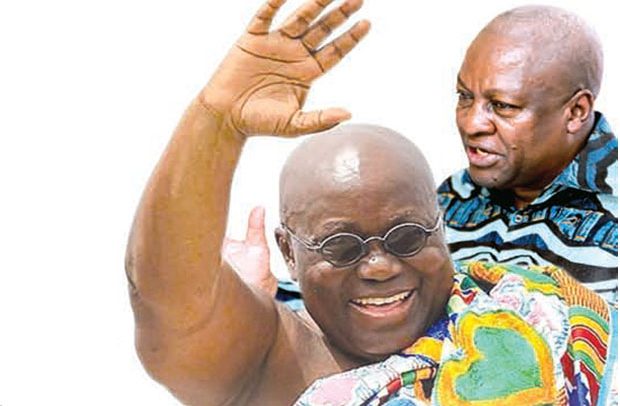President Akufo-Addo, John Mahama
Despite the negative effects of the Covid-19 pandemic on the economic achievements of the ruling New Patriotic Party (NPP), the Economist Intelligence Unit (EIU) has again predicted that President Nana Addo Dankwa Akufo-Addo will defeat the leader of the main opposition party, ex-President John Mahama, in the December 2020 presidential election.
According to the July report which forecast closed in June, Ghanaians still do not trust former President John Mahama under whose presidency, between 2012 and 2016, the economy suffered serious battering.
It said the crucial 2016 election was dominated by public concerns about the faltering economy which many Ghanaians still associate with Mr. Mahama and his poor handling of the economy, and it is still fresh in the memories of the public.
According to the EIU, ahead of the 2020 general election, the Akufo-Addo administration, with hindsight of the effects of Covid-19, has focused on industrialization and infrastructure development, as well as outlining ambitious growth plans for the mainstay of the economy, agriculture, with a view to boosting rural incomes.
“The government’s industrialization push and moves to strengthen the banking sector will benefit non-oil economic growth, although the cost of capital will remain a constraint,” the report said.
“Despite the negative economic impact from the pandemic, the Economist Intelligence Unit believes that it will be difficult for the NDC under Mr. Mahama to portray itself as the better custodian of Ghana’s economy. We, therefore, expect Mr. Akufo-Addo and the NPP to secure re-election,” the report added.
The EIU said following a rise to 7.8% of Gross Domestic Product (GDP) in 2020 as a result of lower oil prices, the current account deficit will narrow in 2021 to 2024 as external conditions and hydrocarbon exports recover.
Ahead of this election, the NPP has focused on industrialization and infrastructure development, as well as outlining ambitious growth plans for agriculture to boost rural incomes.
“Following a marked weakening of the economy in 2020, reflecting a deteriorating current-account position and investor nervousness ahead of the elections, the pace of cedi depreciation will slow in 2021-24 as the hydrocarbons sector ramps up production and rise in prices” the EIU said, adding that after inflation increased to 11.3% in 2020, owing to currency weakness and pandemic-related disruption to supply chains, price rises will slow to an average of 8.8% in 2021-24.
The EIU, however, noted that if the NDC can present a coherent challenge and hold the NPP administration to account on its unfulfilled campaign promises—such as faster progress on infrastructure development—the 2020 elections could be closely contested.
By Thomas Fosu Jnr


